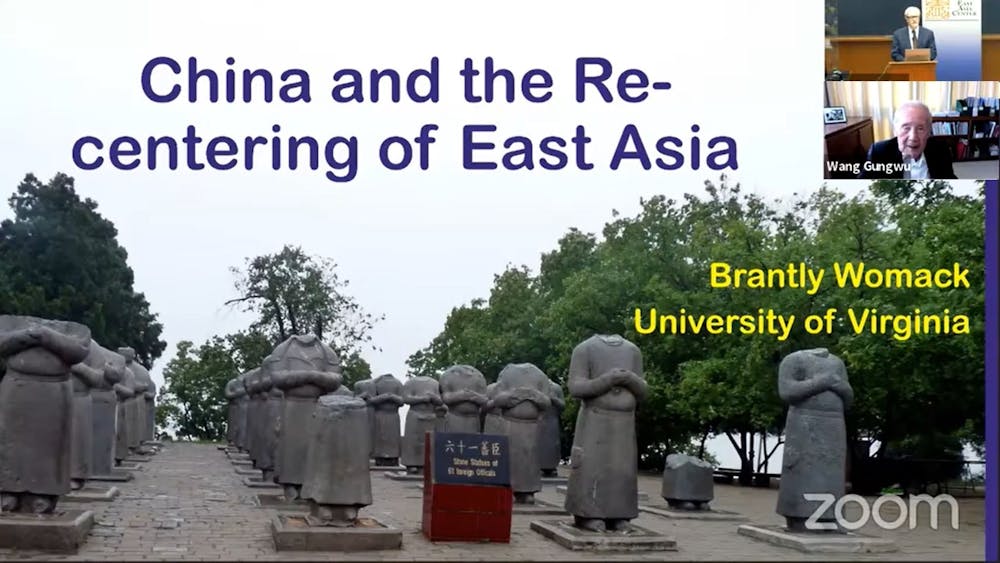When Brantly Womack, Professor Emeritus of Politics at the University of Virginia and Senior Faculty Fellow at the Miller Center, retired from his professorship at the University last May, there was a noticeable loss in the Politics department’s coverage of contemporary China and Chinese politics. No classes on Chinese politics are being offered this semester, and the Politics department has not yet instated a replacement for Womack as the department’s China expert. This was a catalyst for Womack's decision to host a four-part lecture series entitled "China and the Recentering of East Asia" through the University’s own East Asia Center, beginning Thursday and with three more planned through Oct. 7.
"This is my little effort to continue presenting something available to students about the big picture on China and Asia,” Womack said.
Womack’s speaker series has been set to run for four consecutive weekly lectures, covering a chronological scope of China’s history and positioning in the changing regional and global socio-political landscape. Each session will feature Womack’s own knowledge, an assortment of attendee questions organized by a chosen moderator and significant collaboration with a renowned Chinese expert.
"I could combine the presentation, not only with a webinar, but also top Asia experts to comment on the history of Asia or comment on my ideas on the history of Asia," Womack said. "That adds a tremendous amount to the depth and to the richness of the ideas available."
The first session of the series took place Thursday night and was moderated by Ambassador Stephen Mull, the University’s current vice provost for global affairs. To kick off his discussion on the topic of “China's Premodern Centricity,” Womack welcomed Wang Gungwu, a professor at National University of Singapore and renowned Chinese historian, as his first guest collaborator.
In addition to Zoom, the event welcomed both in-person attendance and a livestreamed service on YouTube for those who did not register on time. 300 people alone were registered on Zoom, and this significant online turnout was complemented by the estimated 40 to 50 in-person student and faculty attendees who gathered in Nau Hall's large lecture space. All attendees were masked in accordance with the University's COVID-19 policy, and everyone sat fairly distanced from each other.
East Asia Center Director Dorothy Wong welcomed all of the event’s in-person and virtual attendees at 8:30 p.m. Thursday before passing the microphone to Mull. After a brief recognition of all of Womack’s accomplishments, Mull invited the series' host to take the stage, and the main presentation began.
Womack’s first presentation emphasized three different kinds of continuities throughout Chinese history — situational factors, asymmetric perspectives and relational interactions. The now-retired professor expanded upon each continuity with carefully articulated detail before inviting his guest Gungwu to elaborate, emphasize and challenge his presentation.
“It was a really insightful discussion,” said first-year College student Juan Arratia. “There were a whole bunch of interesting perspectives… My favorite moment would probably be when [Wang] modified a bit of what the Professor said and added a new spin to it, I liked that a lot.”
This interest certainly didn’t end with Arratia — professors and students alike sat attentively in the crowd at Nau Hall.
Attendees took notes, listened and engaged with the professor’s intellectual and humorous insights. Although reasons for attendance varied, there seemed to be a unanimous interest in the chosen subjects being discussed.
“I heard about the event through my engagements class,” first-year College student Reese Whittaker said. “I would really like to attend the other parts of the lecture series ... I think it's important to know history everywhere in the world [because] I'm a firm believer that those who do not learn from history are doomed to repeat it.”
Brian Murphy, the East Asia Center’s administrative coordinator, furthered Whittaker’s take on the importance of understanding history from a more broad perspective.
"I mean, it's not the type of thing that really is taught in the curriculum at any level,” Murphy said. “You know you can get a B.A. and have really no idea about the history of the East ... It's kind of amazing that that's the case, that world history is always so Eurocentric.”
Both Murphy and Whittaker’s responses elucidate the importance of continuing to broaden our understanding of contemporary China despite the topic’s absence from the University’s curriculum this semester. In the wake of the Asian Student Union-led survey report of APIDA students released in February, opportunities like this lecture series hope to continue acting as avenues for awareness and contextualization.
“I think a lot of our students are interested,” Wong said. “I learned that among the U.Va. undergraduate population, 25 percent of students have Asian and Asian American backgrounds. I hope the University pays attention to addressing the needs of the students of Asian and Asian American background.”
In the coming weeks, Womack will return to the podium of Nau 101 and virtually welcome three more internationally esteemed guest speakers from China, Australia and Taiwan.
His selection of speakers is impressive to say the least, and might not have been possible without his ready acceptance of a hybrid format.
"They're all friends of mine and I'm happy to say that they're my number one choices and they all agreed immediately to do this," Womack said. "And even though I think remote teaching has all sorts of problems, remote events — that's something that Zoom has added a whole new dimension of possibility to that we'd never be able to pay for, let alone actually get the people who are going to be commenting over the next few weeks."







